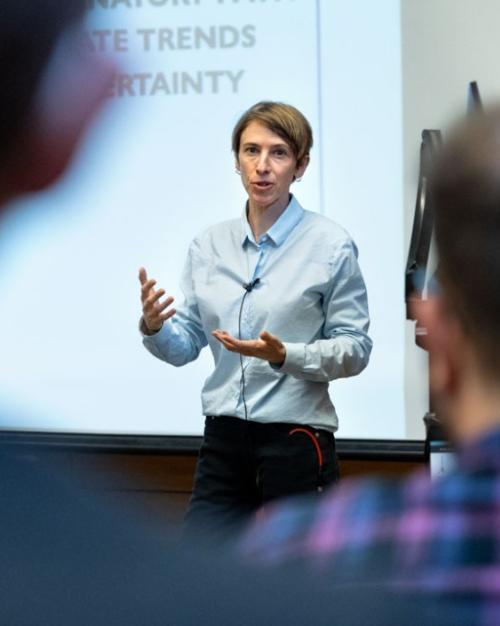Writing about science in easy-to-understand terms “is a good exercise for you and good for the world,” award-winning journalist Natalie Wolchover told close to 100 people gathered in Lewis Auditorium on March 15 for her master class on bringing science to life through storytelling.
“Clearly, there’s a lot of work to do for science communicators to improve literacy and it’s an important goal to strive for,” she said.
Wolchover, the spring 2022 Zubrow Distinguished Visiting Journalist (DVJ) in the College of Arts and Sciences, offered seven principles to follow when communicating about science. The first is to tell a story, she said: Identify where the tension is and then set it up so there is a resolution. She used her story “Does Time Really Flow?” as an example.
When communicating scientific research, include the scientists’ motivations in your story, she said, conveying their passions and emotions: “Show science is a human endeavor by putting people into the story.”
Another principle Wolchover outlined is to always hang your story on a news hook: “Tell the reader why this story deserves attention now,” she said, and identify the deep question behind the research – “the questions everyone wonders about.”
But be sure to take the shortest explanatory path, she urged the audience, with no jargon or information for its own sake. “Every explanation must build toward the resolution of the story,” she said.
At the same time, she said, people are “rightfully” distrustful of straightforward narratives with no nuance. “Embrace complexity, disagreement and uncertainty,” she said.
In her two weeks on campus, Wolchover met with dozens of faculty, including physicists, chemists, mathematicians and engineers, to learn about their research. She also met with leaders of Cornell’s Quantum Initiative, participated in a climate research roundtable organized by the Cornell Atkinson Center for Sustainability, and toured facilities including the Cornell Nanoscale Facility and Cornell High Energy Synchrotron Source.
“Natalie’s stories go deep and wide. Her stories often uncover emerging trends, connect interesting threads, and tackle big questions,” said Ray Jayawardhana, the Harold Tanner Dean of Arts and Sciences. “We’re privileged she’s spent this time with us.”
Wolchover has been writing about science for more than a decade and is senior editor and writer for Quanta Magazine covering physics and math. She has won numerous awards, including the Science Communication Award from the American Institute of Physics and the Evert Clark/Seth Payne Award from the Council for the Advancement of Science Writing. Most recently, Quanta Magazine was nominated for a National Magazine Award in the Reporting category for Wolchover’s story “The Webb Space Telescope Will Rewrite Cosmic History. If It Works.”
In addition to the master class, Wolchover shared her expertise with the Cornell community in a Fireside Chat with Jayawardhana and at a “drop-in” for graduate students. She also offered a career conversation for undergraduates on March 11 in the A&S Career Development Office.
As she told the undergraduates, she’d been a doctoral student in physics when she decided to switch gears and go into science communication. “I realized the balance was off for me,” she said. “I didn’t want to be in this deep silo and work on any one research question. That wasn’t going to be enough for my life. I wanted to learn more.”
Wolchover said she finds story ideas in multiple places – conferences, physics blogs, colloquia at research universities and, in the world of COVID, Zoom calls with researchers sharing their ideas. But probably most importantly, she keeps in touch with researchers she’s met before and uses that network when she works on stories.
“That’s part of what made my time at Cornell so valuable: I met scientists and mathematicians whom I hope to keep talking to for the rest of my career,” Wolchover said. “After two years of the pandemic, getting to tour labs, meet with researchers in person to hear what they’re excited about in their fields, and chat with various student groups about my own field was refreshing and invigorating.”




